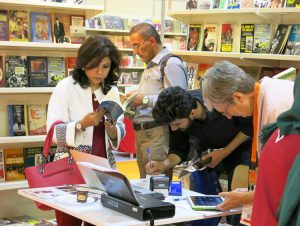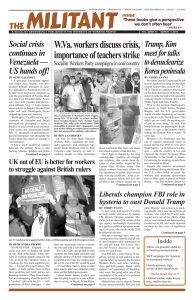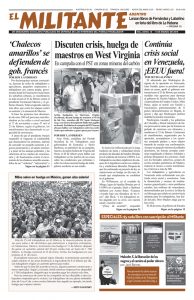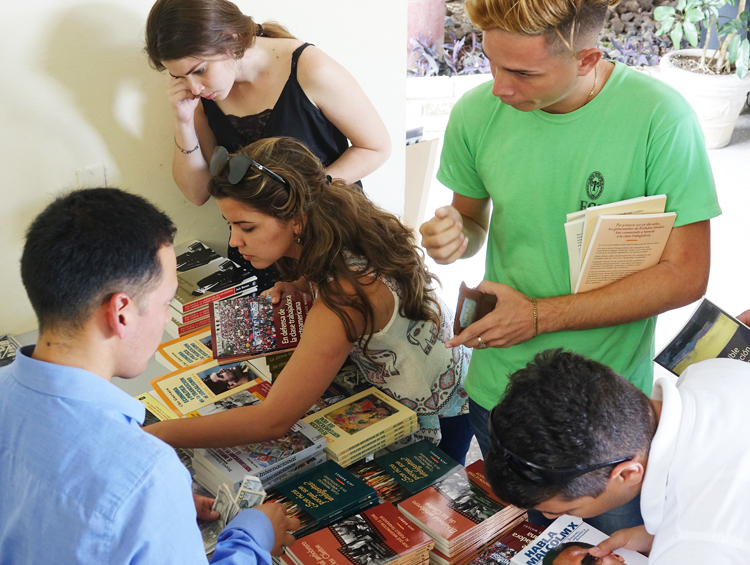Below are the remarks by Mary-Alice Waters at the presentations of Teamster Bureaucracy and In Defense of the US Working Class at the Havana International Book Fair Feb. 14. Copyright © by Pathfinder Press. Reprinted by permission.
On behalf of Pathfinder, I want to extend a warm welcome to everyone, and a special thank-you to Yoel [Cordoví of the Cuban Institute of History] and Silvio [Jova of the Central Organization of Cuban Workers] for their remarks.
For us, it’s not only a privilege to be here today. It’s a necessity. Sharing the histories and experiences of working people in our two countries and learning from each other is indispensable. Only along that road will we be able to draw honest lessons from our defeats and victories alike.
The class struggles in our countries are more strongly interconnected than ever before. What is unfolding around us is the greatest crisis of the capitalist “world order” any of us have known. All the treaties, alliances, “agreements” and fictitious structures imposed on us by the victors of the two world imperialist slaughters of the 20th century are being pulled apart at their seams by the diverging interests and sharpening conflicts between rival capitalist classes and their states. And we are witnessing only the opening stages of their crisis.
What lies ahead are decades of economic, financial and social convulsions that will produce further devastating wars — and more of what the rulers like to obfuscate with terms like “humanitarian crises.” The devastation of the lives of working people such as we have already seen over the last three decades in Afghanistan, Syria, Iraq, Yemen, Libya and beyond are not plagues originating in nature. They are the products of capitalism.
Their crisis, which is also ours, will end in World War III, if the only class capable of taking state power from the capitalist ruling families — the working class together with many layers of fellow exploited producers — fails to do so. And this is true in the United States above all.
It may seem strange that I start this way, but it is what the two books we are presenting today are about. In Defense of the US Working Class by myself and Teamster Bureaucracy by Farrell Dobbs are not just books. They are part of the weaponry we need to arm ourselves for the class battles ahead. Those battles will not be of our choosing or, to begin with, of our making. They will be imposed on us by the capitalist rulers who are driven by the lawful workings of their own system with its inevitable breakdowns.
I want to repeat what the closing paragraphs of In Defense of the US Working Class emphasize. This sobering, realistic assessment of what lies ahead for working people — whether we live in Africa, Asia, Europe, the Pacific or the Americas — is reason for neither panic nor demoralization and despair. To the contrary.
Yes, there will be dark moments and new defeats in the years ahead. We know that. We will be obliged to face them with honesty, speaking the difficult truth to the toilers and drawing the necessary lessons for ourselves and others, as Fidel and the Cuban revolutionary leadership have set an example in doing from the earliest days of struggle.
But defeats are not inevitable.
What is inevitable are new revolutionary struggles. And it is only through those battles that class consciousness among working people, as well as growing confidence and leadership capacity, will develop.
That is why Farrell Dobbs wrote Teamster Bureaucracy, and the other three volumes of the Teamster series (all of which, we are proud to say, are now available here in Spanish translation).
Farrell led workers and our allies in the kind of class combat we will see again. He knew the day was not far off, in historical terms, when an accurate account of the class battles he helped lead would be needed by new generations of vanguard militants among working people, in the U.S. and many other parts of the world.
He would have taken great satisfaction from seeing that begin to happen in Cuba, as witnessed by the discussion we are having here today, as well as elsewhere around the world, including some of the most war-torn regions of the Mideast and Central Asia. And the latter is something I want to say a few words about.
Baghdad book fair
Right now, simultaneous with the Havana International Book Fair, the 46th Baghdad International Book Fair is taking place, and Pathfinder is there. Led by editorial director Steve Clark, Pathfinder is participating for the first time ever.
Book fair organizers in Baghdad have placed the Pathfinder stand — which features the same books you’ll find at our stand here in Havana — in one of the most prominent locations on the exhibit floor. It’s among the first stands visitors see as they enter, and has been one of the busiest. The multiple rows of people waiting to enter have at times been four deep.
While the Baghdad book fair is a long-standing cultural institution in Iraq, this is the first time in recent years that it has been so truly international with some 650 publishers from Iraq as well as from Lebanon, Egypt, Syria, Iran, Saudi Arabia and Libya, along with a few from Europe.
As some of you know, Pathfinder has been the sole U.S.-based publisher at every Havana International Book Fair for more than 30 years. So it will come as no surprise that Pathfinder is also the sole U.S. publisher in Baghdad right now, save one selling mainly technical titles.
We are certainly the only publisher from any country whose books explain, put forward, and celebrate a communist line of march toward workers power.
It is young people and others we’ve gotten to know in the cities of Erbil and Sulaymaniyah in Iraqi Kurdistan — as well as Mosul, Iraq’s second largest city, devastated since 2014 by its Islamic State occupiers, and then by its U.S. Coalition “liberators” — who laid the groundwork for Pathfinder to be in Baghdad. Our participation has been helped in decisive ways by a well-known national leader of the Iraqi Communist Party. Among other things, he has facilitated contact with a number of publishers in the region as well as militants who gather weekly in the historic book district of Baghdad to read and discuss.
Pathfinder representatives visited this historic district early in the book fair. To their surprise, they discovered a number of Pathfinder books in Arabic already on sale there, bought by a book dealer the very first day of the fair! Among them were three that you will recognize from the Pathfinder table here — The Communist Manifesto by Karl Marx and Frederick Engels, Capitalism’s Long Hot Winter Has Begun by SWP National Secretary Jack Barnes and The First and Second Declarations of Havana.
At the Pathfinder table on the side of the room here, you’ll find a photo of that street bookstall.
The runaway best seller at the Baghdad fair has been Are They Rich Because They’re Smart? also by Jack Barnes. Others include Is Biology Woman’s Destiny? by Evelyn Reed; Leon Trotsky on the Jewish Question; Socialism and Man in Cuba by Ernesto Che Guevara; and Opening Guns of World War III, also by Barnes.

The latter, a special issue of the magazine New International, published by Pathfinder, tells the truth about the U.S.- and British-led murderous assault on Iraq following the reactionary, calamitous adventure of the invasion of Kuwait by the regime of Saddam Hussein.
And also among the best-sellers is the same book we’re discussing here today — In Defense of the US Working Class.
Publishers from several countries have approached Pathfinder representatives there for rights to translate to Arabic and distribute numerous Pathfinder titles. To name just one, an agreement was signed only yesterday with a publisher in Syria to produce an Arabic translation of Women in Cuba: The Making of a Revolution Within the Revolution by Vilma Espín, Asela de los Santos and Yolanda Ferrer.
The first part of that book has already been translated to Farsi and released in Iran. The second part will be released this year. So that powerful account of the revolutionary struggle in Cuba — from the underground in Santiago de Cuba, to the Second Front in the Sierras, to the founding years of the Federation of Cuban Women, and the transformation of both women and men it wrought — will soon be widely available in the two largest countries and cultures of the region.
Our participation in the Baghdad book fair is, above all, the product of collaboration that began many years ago with publishers in Iran such as Talaye Porsoo, Golazin and others, some of whom came to know Pathfinder as students when they took refuge in the U.S. from the brutal repression of the U.S.-backed dictatorship of the shah in the 1960s and ’70s.
One of those publishers, Talaye Porsoo, today has a presence in nearly two dozen cities in Iran and throughout the region, reaching all the way to the Afghanistan capital of Kabul in the east. You’ll find a map showing the spread — city by city — when you visit the Pathfinder table.
Talaye Porsoo has translated to Farsi and published in Iran more than 45 of Pathfinder’s most sought-after books, a large number of them on the Cuban Revolution, including speeches and writings by Fidel and Che.
The growing political openings throughout that war-torn region have enabled Pathfinder to also participate in book fairs and other cultural activities in the Kurdish region of northern Iraq over the last two years. In 2017 those events took place less than 50 kilometers [31 miles] from what were then the front lines of the battle to drive the Islamic State out of the city of Mosul. Among the targets of the IS during its rule was the once magnificent library that was part of the university in that ancient center of civilization. It was largely destroyed by Islamic State, its irreplaceable contents burned.
Two months ago, at the invitation of a group of young people who came looking for Pathfinder at the most recent book fair in Erbil, two Pathfinder representatives traveled to Mosul to join in activities they’ve been organizing since September to rebuild the university library and the Mosul Museum, as well as libraries in the city’s high schools.
Many participants donated books for school libraries in Mosul — some a single title, others more. And Pathfinder was among the donors.
Why these books?
I’ve taken the time — perhaps more than I should have — to begin to describe the political and cultural life that is now blooming in these Mideast regions ravaged by imperialism and years of war for one reason alone. It’s because nothing can better capture why Pathfinder publishes the books we do.
Nothing can better explain why many hundreds of working people — throughout the world — dig deeply into their pockets to enable us to respond to such opportunities whenever and wherever they open up.
And nothing better helps answer the questions that are at the center of In Defense of the US Working Class because nowhere in the world do working people lack the capacity to make a socialist revolution. But it is only through our own struggles that we discover those capacities, fighting together along that course. And, as Malcolm X, one of the greatest leaders of the U.S. working class, said so eloquently, that is how we will awaken to our own worth.
You will find in the pages of In Defense of the US Working Class why we categorically reject the view promoted by the liberal bourgeois and leftist media that the electoral victory of Donald Trump registered, above all, a rise in racism, xenophobia, misogyny and other forms of ideological reaction among working people in the United States.
You will read here why we utterly reject the contempt for working people whose skin is “white” expressed so baldly by Democratic Party candidate Hillary Clinton in the last presidential elections. Labeling them an irredeemable “basket of deplorables,” Clinton singled out especially “married white women,” whom she said didn’t vote for her because they were too weak to stand up to their husbands and sons.
As you will discover in the pages of In Defense of the US Working Class, the last year and a half of strikes, marches and other labor actions across the country by teachers, hotel workers, nurses and other predominantly female workers have alone put paid to that slander.
You will be able to see why the exploding class anger of the “yellow vests” in France, as well as the rejection by working people in the United Kingdom of the imperialist abomination called the European Union, inspires us with growing confidence, not fear.
You will understand why we demand “Amnesty now!” for all undocumented immigrants living and working in the U.S. The entire history of the working-class movement has taught us it’s a cornerstone of the fight to strengthen the working class and the possibility — through waves of struggle — to transform our trade unions into instruments of revolutionary class struggle.
Here you will learn about our demand for the withdrawal of all U.S. troops from Africa, from Syria, Iraq, Afghanistan, and from Korea — to say nothing of Colombia, Japan — and Guantánamo. Why the dismantlement of NATO with its bases throughout the world is in the interests of working people everywhere.
And we insist without the slightest equivocation that, “Yes, a socialist revolution in the U.S. is possible.” But even more important, we know that revolutionary struggles there — and elsewhere around the world — are coming. And it is only through those battles that new generations of working people, and the youth who are won to their side, will transform themselves as they find their own road to becoming communists.
It is our own experiences in the U.S. class struggle that form the bedrock of our convictions on these questions. And that is what you will find in the pages of In Defense of the US Working Class and all four volumes of the Teamster series.
If I may borrow the words of Farrell Dobbs in his “Afterword” to Teamster Bureaucracy, the principal lesson to derive from the Teamsters’ course of struggle for more than seven years “is not that, under an adverse relationship of forces, workers [engaged in struggle] can be overcome.”
The principal lesson is the opposite. With the honest and truly revolutionary leadership they deserve, it is the oppressed and exploited toilers who can triumph.
And that is also the principal lesson taught us by the men and women of Cuba who — under Fidel’s leadership — carried the Cuban Revolution to victory, and have held the imperialist colossus at bay — for 60 years and counting.


